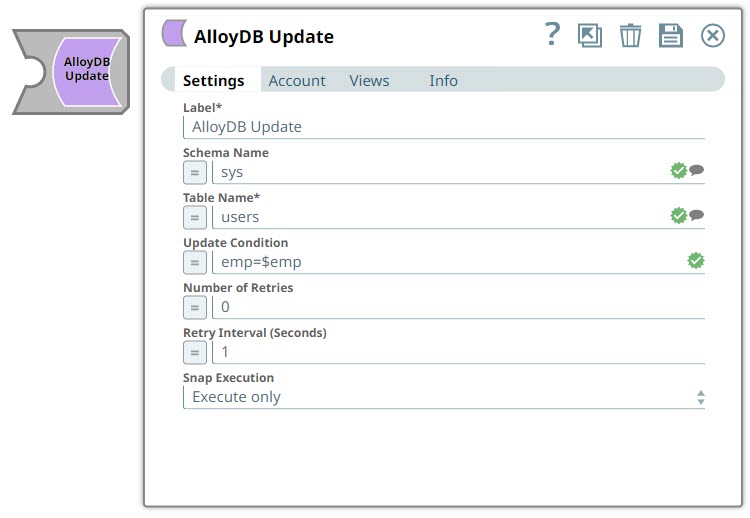AlloyDB Update
Overview
You can use this Snap to execute an AlloyDB update with the given properties.

Updates are batched up until the account's batch size property or the structure of the update statement changes. An update statement will change if an incoming document contains different keys than a previous document.
Write-type Snap
Works in Ultra Tasks
Snap views
| View | Description | Examples of upstream and downstream Snaps |
|---|---|---|
| Input | Schema name, table name, and the update condition to apply on the query. | |
| Output | Keys from the document are used as the columns to update, and their values are the updated values in the column. | |
| Error |
Error handling is a generic way to handle errors without losing data or failing the Snap execution. You can handle the errors that the Snap might encounter when running the pipeline by choosing one of the following options from the When errors occur list under the Views tab. The available options are:
Learn more about Error handling in Pipelines. |
|
Snap settings
- Expression icon (
): Allows using pipeline parameters to set field values dynamically (if enabled). SnapLogic Expressions are not supported. If disabled, you can provide a static value.
- SnapGPT (
): Generates SnapLogic Expressions based on natural language using SnapGPT. Learn more.
- Suggestion icon (
): Populates a list of values dynamically based on your Snap configuration. You can select only one attribute at a time using the icon. Type into the field if it supports a comma-separated list of values.
- Upload
 : Uploads files. Learn more.
: Uploads files. Learn more.
| Field / Field set | Type | Description |
|---|---|---|
| Label | String | Required. Specify a unique name for the Snap. Modify this to be more appropriate, especially if more than one of the same Snaps is in the pipeline. Default value: AlloyDB Update Example: AlloyDB Update |
| Schema name | String/Expression/ Suggestion | The database schema name. Selecting a schema filters the Table name list
to show only those tables in the selected schema. The property is suggestible and
will retrieve available database schemas with suggested values. Warning: The values can be passed using the Pipeline parameters but not the upstream
parameter. Default value: None. Example: myschema |
| Table name | String/Expression/ Suggestion | The name of the table to execute the update operation on. Warning: The values can be passed using the pipeline parameters but not the upstream
parameter. Default value: None. Example: people |
| Update condition | String/Expression | Condition to execute an update on. Tip: In scenarios where you want
to use specific data from the upstream Snaps, and do not want to change that data
in the Update Snap, then you need to place the data in the
original structure of the input document. Therefore, we
recommend that you use the format for Update condition and input data format as
shown below: Warning: In a scenario where the downstream Snap
depends on the data processed in an Upstream Database Bulk Load Snap, use the
Script Snap to add a delay for the data to be available. Warning: Using expressions that join strings together to create SQL queries
or conditions has a potential SQL injection risk and therefore is unsafe. Ensure
that you understand all implications and risks involved before using a
concatenation of strings with '=' Expression enabled. Default value: None. Examples: Without using expressions
Using expressions
|
| Number of retries | Integer/Expression | Specify the maximum number of attempts to be made to receive a response. The
request is terminated if the attempts do not result in a response. Default value: 0 Example: 3 |
| Retry interval (seconds) | Integer/Expression | Specifies the time interval between two successive retry requests. A retry
happens only when the previous attempt resulted in an exception. Default value: 1 Example: 10 |
| Snap execution | Dropdown list |
Choose one of the three modes in
which the Snap executes. Available options are:
Default value: Execute only Example: Validate & Execute |


